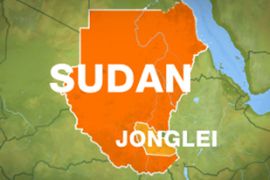Scores killed in Sudan clashes
Officials say more than 100 people killed in tribal raid in the country’s south.

“From the attackers, 23 bodies were found on the ground. These attackers were found in uniform with arms and organised in a military organisation in platoons with G3 rifles,” Kuol said.
Soldiers attacked
Mayen Ngor, the commissioner of Duk County, said the attackers had burned down 260 huts, the police station and local government buildings.
“This is a campaign against the Comprehensive Peace Agreement [the 2005 accord that ended Sudan’s north-south civil war] and against the people of Duk,” he said.
The attack injured 46 people and forced thousands to flee, according to Ngor.
|
“It is way too early to call this a civil war, but it is a significant law and order problem and one that the government of southern Sudan need to stand up and address.” David Gressly, United Nations Missions in Sudan |
David Gressly, a regional co-ordinator in south Sudan for the United Nations Missions in Sudan, said the attack appeared to have targeted SPLA forces based in the village.
“It is quite clear that the focus of the attack was on the organised forces themselves,” he said.
“It is way too early to call this a civil war, but it is a significant law and order problem and one that the government of southern Sudan needs to stand up and address,” he told the AFP news agency after visiting the area.
A surge of tribal killings this year has sparked fears for the stability of Sudan’s under-developed south.
The United Nations estimates more than 1,200 people have died in ethnic attacks this year.
The Sudanese People’s Liberation Movement (SPLM), which heads an autonomous regional government in the south, fought a two decades long civil war with the northern National Congress Party (NCP), now headed by Omar al-Bashir, Sudan’s president.
The two parties signed a peace treaty in 2005, but tensions have remained.
North blamed
Yien Matthew, a spokesman for SPLM, told Al Jazeera that his movement believed the NCP was behind Sunday’s attack.
“Some of the civilians who witnessed the attack saw they [the armed men] had big weapons and thuraya [satellite] phones – a clear indication that they are directed by the NCP.
“We cannot expect that in such an area armed men have satellite phones and big weapons, which proves that they have been directed by the NCP in Khartoum,” Matthew said.
“All evidence at the moment proves the NCP is behind this.”
Southern politicians have accused the north of arming rival tribes to destabilise the region in the build-up to elections in 2010 and a referendum on southern secession in 2011.
The government in Khartoum denies the accusation.
Analysts say many of the northern political elite are nervous about the referendum, and the prospects of losing the south, the source of most of Sudan’s oil reserves.